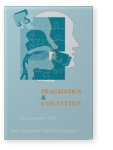Vol. 21:2 (2013) ► pp.359–379
Instructions or dominion?
The meaning of the Spanish subjunctive mood
In a highly interesting study, Dam and Dam-Jensen (2010) put forward the idea that the indicative and the subjunctive mood in Spanish complementizer phrases can be explained by the instructions they convey. The indicative instructs the addressee to locate the situation created by the verb relative to the situation of utterance, whereas the subjunctive instructs the addressee not to locate the situation described by the verb relative to the situation of utterance. Although this explanation is most appealing, the present paper argues that it also may create explanatory problems. Thus, it is claimed that the notion of dominion can explain the semantic meaning of the Spanish subjunctive mood. This verbal mood designates events that are located outside the conceptualizer’s dominion, either in terms of epistemic control or in terms of effective control.
Cited by
Cited by 2 other publications
This list is based on CrossRef data as of 13 june 2024. Please note that it may not be complete. Sources presented here have been supplied by the respective publishers. Any errors therein should be reported to them.
